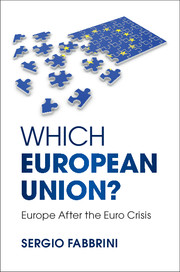Book contents
- Frontmatter
- Dedication
- Contents
- List of boxes
- List of figures
- List of tables
- List of abbreviations
- Preface – How many unions?
- Acknowledgments
- Part I Institutionalization of multiple unions
- Part II Main perspectives on the European Union
- Part III Towards the compound union perspective
- 7 Comparing democratic models
- 8 Compound unions and the EU
- 9 A new political order in Europe
- Appendix
- Glossary
- References
- Index
9 - A new political order in Europe
Published online by Cambridge University Press: 05 March 2015
- Frontmatter
- Dedication
- Contents
- List of boxes
- List of figures
- List of tables
- List of abbreviations
- Preface – How many unions?
- Acknowledgments
- Part I Institutionalization of multiple unions
- Part II Main perspectives on the European Union
- Part III Towards the compound union perspective
- 7 Comparing democratic models
- 8 Compound unions and the EU
- 9 A new political order in Europe
- Appendix
- Glossary
- References
- Index
Summary
La fédération des États-nations [est une] philosophie institutionnelle pour finir par plaider … pour un bon compromise entre la méthode communautaire et la méthode intergouvernementale.
Jacques Delors, past president of the European Commission, July 6, 2012Introduction
The process of European integration has been accompanied by alternative competing visions regarding its finality. Those competing visions were not coherently articulated during the first decades of the process. Indeed, they were often kept implicit. Nevertheless, different perspectives on the EU have accompanied the integration process. Although the EU started as an international organization in the first years of its life, since the rulings of the ECJ in the 1960s and the decisions taken at the IGCs in the 1970s and 1980s, it has silently acquired the features of a supranational polity presiding over an increasingly large common and then single continental market. The different waves of enlargement in the 1970s and 1980s increased the pluralism of perspectives on the finality of the process of integration, with the formation of an economic community vision of the integration process competing with the political union vision that was still in the majority. The end of the Cold War and the implosion of the Soviet Union between 1989 and 1991 led the EU to face dramatic new challenges. Two in particular became crucial: first, the EU had to assume an international role, developing an autonomous foreign and security policy, given that it could no longer justify the traditional protection from the USA once the Soviet Union had disappeared; second, the EU had to find a supranational counterweight to the unification of Germany made inevitable by the crumbling of the Berlin Wall.
The 1992 Maastricht Treaty was the answer to those challenges. For this reason it represents a qualitative leap in the process of integration. The preparation and then approval of the Treaty made clear that the EU had to Europeanize new policies that were traditionally at the core of national sovereignty, such as (inter alia) foreign, security, economic and monetary policies.
- Type
- Chapter
- Information
- Which European Union?Europe After the Euro Crisis, pp. 257 - 288Publisher: Cambridge University PressPrint publication year: 2015



